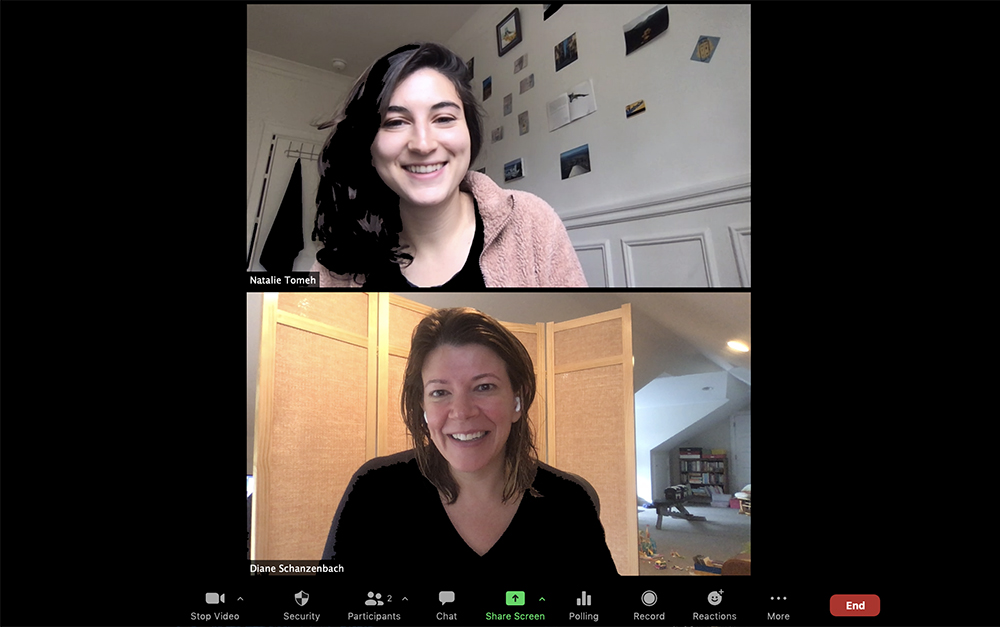Undergraduates Gain Valuable Research Skills in a Rapidly Changing World
Amid the COVID-19 pandemic, students still got 'hands-on' policy-relevant research experience, albeit remotely
Get all our news
I love supporting undergraduate research assistants at IPR because it exposes them to relevant research and potential career paths working on solutions to critical problems. I want students to learn that they can do well by doing good. IPR provides exposure to work that will make a difference!”
Terry Bayer
Corporate director and former healthcare executive

IPR director and economist Diane Schanzenbach worked with undergraduate research assistant Natalie Tomeh on Zoom this summer to study food insecurity and employment.
The Institute for Policy Research has hired undergraduate students to conduct research with IPR faculty for the Summer Undergraduate Research Assistants (SURA) program for more than 20 years, but there’s never been a summer like 2020. Amid the COVID-19 pandemic, students and their faculty mentors adapted to a rapidly changing research environment, pivoting to mostly online work.
Directed by IPR social demographer Christine Percheski, the program sponsored over 30 undergraduate RAs this year despite the challenges of working remotely. The tasks undergraduates do alongside IPR faculty mentors give them skills that carry far beyond the summer.
“Our undergraduate students rose to the many challenges presented by the pandemic to serve as research assistants this summer,” Percheski said, “and they contributed so much to our research projects! Faculty raved about the commitment, hard work, and brilliance displayed by their research assistants this summer.”
Percheski also pointed out how the program allows faculty to connect with undergraduates and share what they are passionate about—research that has policy impact—and allows them to teach in a different way than in the classroom.
The program also got a boost this summer thanks to a generous gift from corporate director and former healthcare executive Terry Bayer (Communication ’72) that helped fund two undergraduate RAs.
“I love supporting undergraduate research assistants at IPR,” Bayer said, “because it exposes them to relevant research and potential career paths working on solutions to critical problems. I want students to learn that they can do well by doing good. IPR provides exposure to work that will make a difference!”
One student who was able to participate thanks to Bayer’s gift was Natalie Tomeh, a rising senior studying mathematical methods in the social sciences and economics with a minor in data science. She helped develop powerful data visualization tools that shed light on policy-relevant issues. Tomeh worked with IPR director Diane Whitmore Schanzenbach to build an app that uses data from the Census Household Pulse Survey to show weekly rates of food insecurity for respondents with and without children, sortable by race and ethnicity for selected states.
Ahmadu Simpson also received support from Bayer’s donation. A rising senior as well, Simpson is majoring in psychology and worked for the second summer in a row with IPR health psychologist Edith Chen. He gained experience in technology and lab procedures as a research assistant on the Mentoring and Health Study, which investigates the health effects of mentoring on both mentees and mentors, as well as the psychosocial pathways explaining these effects.
“This summer looked different because we had no visits” from participants in the study, Simpson said. “I got to learn about the strategizing that’s done with recruitment and general lab flexibility…[and] it was impressive to see how the lab adapted.”
SURA students have written about their experiences in a blog each summer since 2018. The blog of summer 2020 included familiar themes of students embracing social science research but also new discussions of working during the pandemic.
Michelle Sheinker, a junior majoring in social policy and legal studies with a minor in psychology, worked with IPR social policy expert Tabitha Bonilla to research the effects of campaign promises on voter perception and behavior. To mark this year’s upcoming election, they analyzed President Trump’s first-term campaign promises, seeking to find whether voters see Trump as an effective leader based on how deliverable his promises seem.
“[Professor Bonilla] has offered me a glimpse into the rich world of substantive policy research, and the lessons I learn from her continue to inspire my goals as an aspiring changemaker,” Sheinker wrote in a blog this summer.
Former IPR Director Fay Lomax Cook started the SURA program in 1998 to increase Northwestern undergraduates’ involvement in social science research. It is one of the University’s longest-running undergraduate research programs.
For more information on the program or to find out more about IPR’s summer undergraduate RAs, read their bios or the blog.
Published: October 13, 2020.


